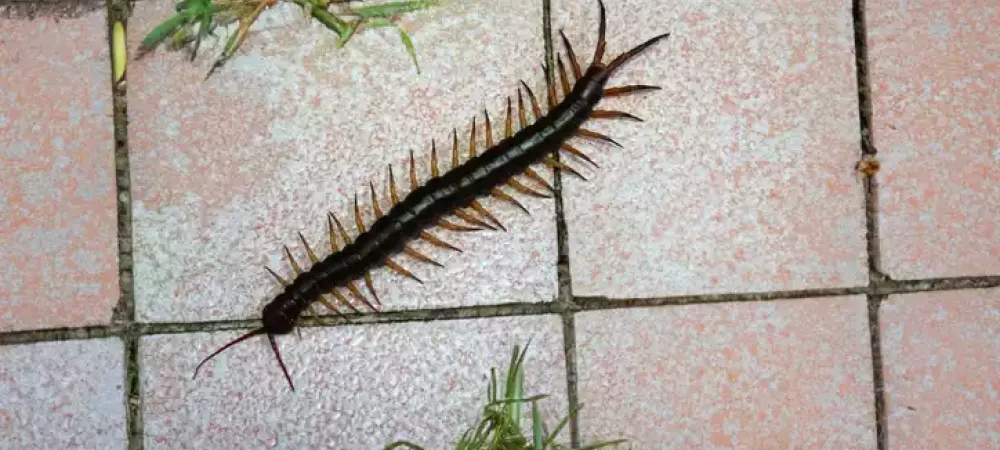Centipede & Millipede Control Jupiter, FL

Living in Jupiter, Florida, means enjoying warm weather and beautiful landscapes, but it also means encountering pests like centipedes and millipedes. While these multi-legged creatures are beneficial to the environment, their presence in homes can be unsettling. In this guide, we’ll break down the differences between centipedes and millipedes, explain their behaviors, and give you tips on how to prevent and control them in your home.
What’s the Difference Between Centipedes and Millipedes?
Centipedes and millipedes are often confused, but they are quite different in terms of behavior and habitat. Understanding these differences can help you determine the best way to manage them around your home.
Centipedes:
- Appearance: Centipedes are long, flat, and have one pair of legs per body segment. Their legs are long, which helps them move quickly.
- Behavior: Centipedes are predators that feed on other insects, spiders, and pests. They use their venomous claws to catch prey, making them useful in controlling insect populations around your home.
- Speed: They are fast-moving and tend to hide in dark, damp spaces.
Millipedes:
- Appearance: Millipedes are rounder and have two pairs of legs per body segment, giving them a more segmented, worm-like appearance.
- Behavior: Unlike centipedes, millipedes are decomposers. They feed on decaying plant material, helping to break down organic matter.
- Defense Mechanism: When threatened, millipedes curl into a tight spiral and may release a smelly fluid, though it’s harmless to humans.
Where Do Centipedes and Millipedes Thrive in Jupiter?
Both centipedes and millipedes thrive in Florida’s humid climate, especially in areas like Jupiter, where moisture and lush vegetation create perfect conditions for them. They prefer:
- Dark, damp environments like under rocks, garden mulch, leaf litter, or rotting wood.
- Moist areas around homes like basements, bathrooms, and crawl spaces.
During heavy rain or periods of drought, these pests may venture into homes seeking moisture and shelter.
How to Prevent Centipedes and Millipedes from Entering Your Home
Preventing centipedes and millipedes from invading your home is easier than you think. By focusing on reducing moisture and sealing entry points, you can significantly reduce the chances of them becoming unwanted guests.
1. Reduce Moisture
Both centipedes and millipedes are drawn to moisture, so keeping your home dry is the first line of defense.
- Fix Leaks: Repair leaky pipes, faucets, or drainage issues around your home to prevent water buildup.
- Use Dehumidifiers: In areas prone to moisture, like basements or bathrooms, use dehumidifiers to reduce humidity levels.
- Proper Ventilation: Ensure your home is well-ventilated, particularly in crawl spaces, to prevent moisture accumulation.
2. Seal Entry Points
Inspect your home’s exterior and seal cracks, gaps, and openings where centipedes or millipedes might enter.
- Caulk Gaps: Seal gaps around windows, doors, and foundation cracks.
- Install Weather Stripping: Use weather stripping around doors to prevent pests from sneaking in.
- Screen Vents: Ensure vents, windows, and crawl spaces have screens that are in good condition to block entry points.
3. Clear Outdoor Debris
Centipedes and millipedes are attracted to decaying organic matter. Reducing outdoor debris near your home can keep them from getting too close.
- Remove Leaf Litter and Mulch: Regularly clear away leaf litter, mulch, and garden debris that provide habitat for these pests.
- Stack Firewood Away from Home: Store firewood at least 6 inches off the ground and away from your home’s foundation.
4. Proper Mulching
Mulching is great for your garden, but too much mulch near your home’s foundation can invite pests.
- Keep Mulch Away from Foundation: Maintain at least a 6-inch barrier between mulch and your home’s foundation to reduce the likelihood of millipedes and centipedes taking up residence.
Natural Control Methods
In Jupiter, where the local ecosystem thrives, eco-friendly pest control methods can help manage centipedes and millipedes without harming the environment.
1. Encourage Natural Predators
Natural predators like birds, toads, and beetles can help keep centipede and millipede populations under control.
- Bird-Friendly Gardens: Plant native trees and shrubs to attract insect-eating birds to your yard.
- Install a Garden Pond: If feasible, a small pond can encourage toads, which naturally prey on millipedes and centipedes.
2. Use Natural Repellents
While centipedes and millipedes are generally harmless, you can use natural repellents to discourage them from settling around your home.
- Essential Oils: Spraying peppermint or tea tree oil around windows, doors, and baseboards can help repel centipedes naturally.
Chemical Control for Severe Infestations
In cases where centipedes and millipedes become a persistent problem, chemical treatments may be necessary. For severe infestations, it’s best to consult a professional pest control service like Blue Door Pest Control in Jupiter, FL.
- Insecticides: Apply insecticides specifically designed for centipedes and millipedes around your home’s perimeter. Be sure to follow the product’s instructions carefully.
- Professional Treatments: Blue Door Pest Control offers targeted, eco-friendly pest control solutions for dealing with centipedes and millipedes. We focus on minimizing the use of chemicals while ensuring your home stays pest-free.
Why Professional Pest Control Is Important
While centipedes and millipedes are part of a healthy ecosystem, their presence in your home can be unsettling. At Blue Door Pest Control, we understand how to manage these pests effectively while protecting your home and the environment. Our team of professionals provides comprehensive pest management services for homes in Jupiter, Palm Beach Gardens, Tequesta, and surrounding areas. From prevention to control, we tailor our services to your specific needs, ensuring your home stays pest-free year-round.
Conclusion: Keep Centipedes and Millipedes Out of Your Jupiter Home
While centipedes and millipedes play important roles in Florida’s ecosystem, their presence in your home is less than ideal. By focusing on moisture control, sealing entry points, and using natural repellents, you can effectively manage these pests and keep your home pest-free.
For more persistent infestations, contact Blue Door Pest Control. We offer professional, eco-friendly pest control solutions that ensure your home stays free of centipedes, millipedes, and other unwanted pests. Schedule your free consultation today to learn more about how we can help protect your home.
Frequently Asked Questions About Centipedes and Millipedes in Jupiter, FL
Q: Are centipedes and millipedes harmful to humans?
A: Centipedes can bite, but their venom is usually harmless to humans, resulting in mild irritation. Millipedes don’t bite but can release a foul-smelling fluid when threatened. Overall, both are more of a nuisance than a danger.
Q: What attracts centipedes and millipedes to my home?
A: Both are attracted to moisture. They seek out damp, dark areas like basements, bathrooms, and crawl spaces. Reducing moisture and sealing entry points can help keep them out.
Q: How can I prevent centipedes and millipedes from entering my home?
A: To prevent them, reduce moisture by fixing leaks and using dehumidifiers. Seal any cracks around your home’s foundation, windows, and doors, and regularly clear outdoor debris.
Q: When should I call a professional pest control service for centipedes or millipedes?
A: If you notice a persistent or severe infestation that natural remedies can’t control, it’s time to call Blue Door Pest Control. Our professional treatments are safe, effective, and eco-friendly.
